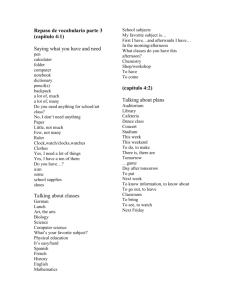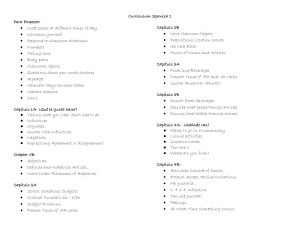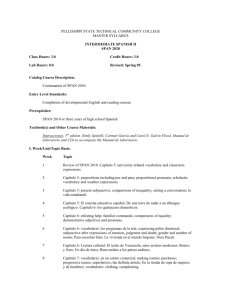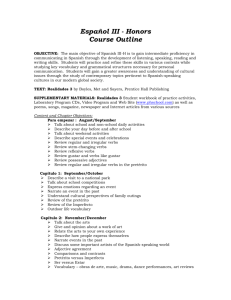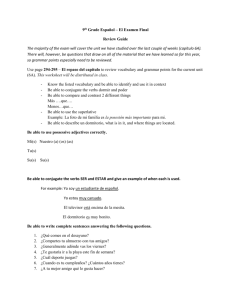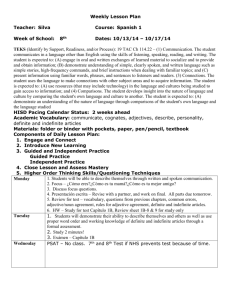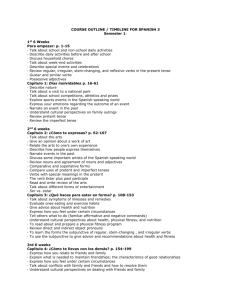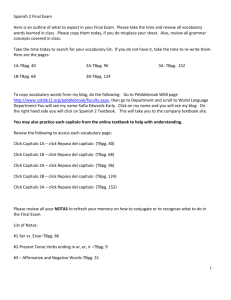SPN2200 - SchoolNotes
advertisement
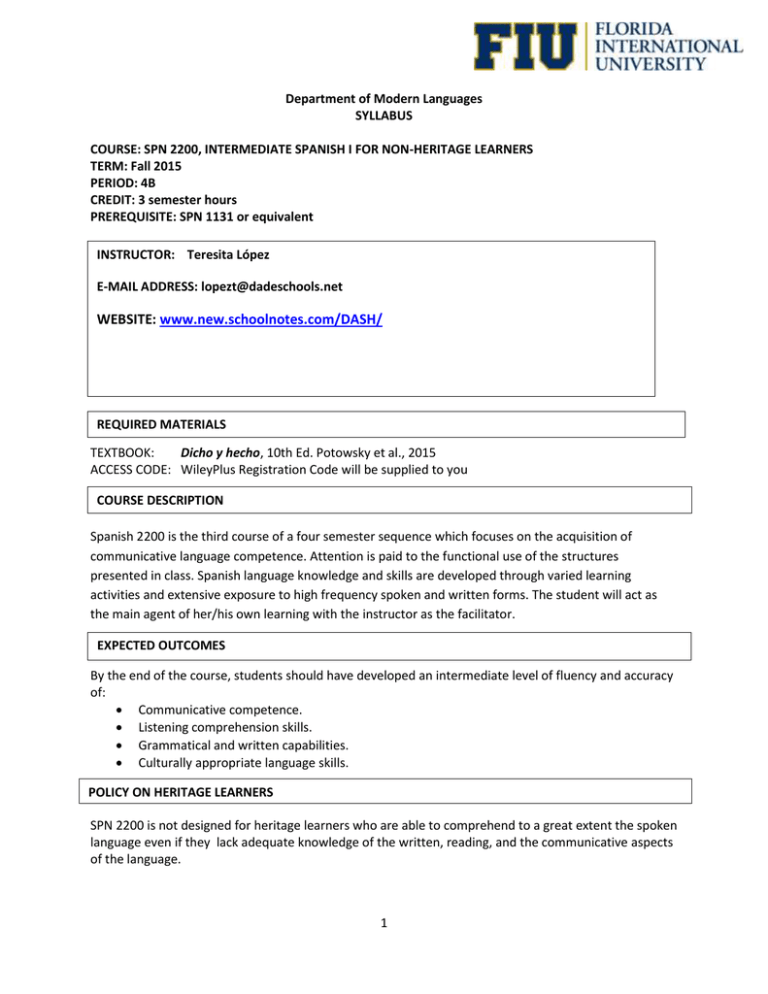
Department of Modern Languages SYLLABUS COURSE: SPN 2200, INTERMEDIATE SPANISH I FOR NON-HERITAGE LEARNERS TERM: Fall 2015 PERIOD: 4B CREDIT: 3 semester hours PREREQUISITE: SPN 1131 or equivalent INSTRUCTOR: Teresita López E-MAIL ADDRESS: lopezt@dadeschools.net WEBSITE: www.new.schoolnotes.com/DASH/ REQUIRED MATERIALS TEXTBOOK: Dicho y hecho, 10th Ed. Potowsky et al., 2015 ACCESS CODE: WileyPlus Registration Code will be supplied to you COURSE DESCRIPTION Spanish 2200 is the third course of a four semester sequence which focuses on the acquisition of communicative language competence. Attention is paid to the functional use of the structures presented in class. Spanish language knowledge and skills are developed through varied learning activities and extensive exposure to high frequency spoken and written forms. The student will act as the main agent of her/his own learning with the instructor as the facilitator. EXPECTED OUTCOMES By the end of the course, students should have developed an intermediate level of fluency and accuracy of: Communicative competence. Listening comprehension skills. Grammatical and written capabilities. Culturally appropriate language skills. POLICY ON HERITAGE LEARNERS SPN 2200 is not designed for heritage learners who are able to comprehend to a great extent the spoken language even if they lack adequate knowledge of the written, reading, and the communicative aspects of the language. 1 COURSE EVALUATION PARTICIPATION INDIVIDUAL PRESENTATION VIDEO PROJECT HOMEWORK (WILEYPLUS) COMPOSITIONS (3) MIDTERM EXAM FINAL EXAM 15% 5% 10% 20% 15% 15 % 20% GRADE SCALE (This scale will be used to enter your grade at FIU) A AB+ B BC+ 100-93.0 92.9-90.0 89.9-88.0 87.9-83.0 82.9-80.0 79.9-78.0 C CD+ D DF 77.9-73.0 72.9-70.0 69.9-68.0 67.9-63.0 62.9-60.0 59.9-BELOW A STUDENT WHO RECEIVES A GRADE OF “C-“, OR BELOW, IN THIS COURSE, OR LESS THAN A “C” IN A HIGH SCHOOL COURSE, WILL BE DROPPED FROM FIU’S DUAL ENROLLMENT PROGRAM GRADE SCALE (This scale will be used to enter your grade at DASH) A B C D F 100-90 89-80 79-70 69-60 59-BELLOW ATTENDANCE: Students are expected to attend class regularly and to come to class prepared and ready to participate actively. Tardiness is disruptive to the class; therefore, students should be on time for class. A student will automatically receive a grade of F as the final grade for the course if the student is absent from 40% (or more) of the total number of classes for the semester. NOTE: In order to maintain an environment conducive to learning, students are asked to turn off or silence Smart phones, Ipods and all electronic devices before entering the classroom. 2 PARTICIPATION (15%): Each week, your instructor will evaluate your participation level and you will have the opportunity to earn 5 points for every class if you speak in Spanish during the whole class and in group discussions and participate in all activities with enthusiasm and a positive attitude. HOMEWORK (20%): Students are responsible for reading, prior to class, the textbook pages containing the explanations of the grammatical points to be used and practiced during the in-class activities. Students will complete the homework exercises (listening, reading, grammar) on Blackboard/WileyPlus by the due date. Regular homework assignments will appear on www.new.schoolnotes.com/DASH/ INDIVIDUAL PRESENTATION (5%): Students will prepare ONE brief (5-min. long) individual presentation in Spanish during the semester. Here is a list of possible topics on which students can give presentations: 1) a cultural trip you took to a country, city, or area of the Spanish-speaking world, 2) the plot and/or symbolism of a literary piece originally written in Spanish, 3) the plot and/or symbolism of a movie originally filmed in Spanish, 4) the history and meaning of a tradition or holiday typical of a Spanish-speaking country, city, area, 5) a specific historical event or a current political and/or social situation in a country, city of area of the Spanish-speaking world, or 6) the life and work of an author or artist from the Spanish-speaking world, among other possible topics. You will need to submit an outline of your talk to your instructor by the deadline stipulated by your instructor to approve the topic of your presentation and for your instructor to be able to help you both organize the flow of your presentation and identify audiovisual aids with which to illustrate and enliven your presentation. Reading your presentation is not allowed. VIDEO PROJECT (10%): Each group (of 3 or 4) will do a video (no more than 5 minutes) in Spanish about a topic such as Hispanic food, Hispanic customs and traditions or other related topics with instructor’s permission. Topics may, for example, include autobiographical speeches or how-to demonstrations. Students should come up with creative ideas that maintain the audience’s attention. Videos will be shown in class. Your instructor will provide you with more information on the project. COMPOSITIONS (15%): You will be required to write in class a total of 3 compositions in Spanish on a topic assigned by your instructor on the date indicated by him/her. MIDTERM EXAM (15%) and FINAL EXAM (20%): There will be two in-class exams: a midterm and a final exam. The midterm will be over chapters 11, 12, and 13, and the final will be comprehensive over Chapters 11, 12, 13, 14, and 15. There will be no make-ups without a valid reason. In order to reschedule the exam, a documented valid reason must be presented. Instructors may have pop quizzes as deemed necessary. STUDENT RESPONSIBILITIES INCOMPLETE GRADE: A grade of “I” is only given when there is a valid, documented reason, which prevents the student from completing the course. A student should have completed at least 60% of the course work in order to get an Incomplete grade. If such reason arises, please advise your instructor immediately, and make arrangements for removing the Incomplete as soon as possible. 3 ACADEMIC DISHONESTY: All course work must be the work of the student; otherwise, it is considered cheating. Plagiarism, cheating, and forgery are serious offenses and will not be tolerated as stated in the Academic Misconduct section of FIU’s Academic Affairs Policies, Manuals, and Handbooks. STUDENTS WITH DISABILITY: Accomodations will be provided as per Miami Dade Public School’s Individual Education Plan (IEP). COURSE CALENDAR WEEK 1 Introduction to the course: going over the syllabus and giving instructions of how to register for WileyPlus/Bb. Capítulo 11: Amigos y algo más Lesson goals: Talk about human relationships and the stages of life Amigos y algo más pp. 328-329 Capítulo 11: Amigos y algo más Lesson goals: Express wishes and requests related to other people´s actions Introduction to the subjunctive mood pp. 336-337 Cultura: Panamá (optional) p. 335 WEEK 2 Capítulo 11: Amigos y algo más Lesson goals: Express wishes and requests related to other people´s actions The subjunctive with expressions of will, influence, desire and request p. 339 Communicative activities Capítulo 11: Amigos y algo más Lesson goals: Get in touch with people Para estar en contacto: Las llamadas telefónicas p. 344 Cultura: Amistades aquí y allá p. 346 WEEK 3 Capítulo 11: Amigos y algo más Lesson goals:Express emotional reactions and feelings about other people´s actions The subjunctive with expressions of emotion pp. 348-349 Capítulo 11: Amigos y algo más Lesson goals: Talking about what will happen The future tense p. 353 Communicative activities 4 WEEK 4 Capítulo 11: Amigos y algo más Lesson goals: Talking about what would happen The conditional tense p. 355 Communicative activities Lesson goals: Read, talk, write or watch a video about relationships Para leer, Para conversar, VideoEscenas, Para ver y escuchar, Para escribir, Para ver y escuchar (to select some activities from the list) WEEK 5 Capítulo 12: Vive la naturaleza Lesson goals: Talk about the environment and outdoor adventures. Stating purpose, destination, and motive Vive la naturaleza pp. 366-367 Vacaciones al aire libre p. 371 Para y por p. 373 Capítulo 12: Vive la naturaleza Lesson goals: Talk about the environment La naturaleza y el medio ambiente p. 375 Cultura: Costa Rica p. 378 (optional) WEEK 6 Capítulo 12: Vive la naturaleza Lesson goals: Express doubt or disbelief The subjunctive with expressions of doubts or negation p. 379 Capítulo 12: Vive la naturaleza Lesson goals: Talk about activities with an unspecified or unknown subject Se + verbo p. 384 Para leer, Cultura, Para conversar, Para escribir, VideoEscenas, Para ver y escuchar (to select some activities from the list) WEEK 7 Capítulo 13: De viaje Lesson goals: Talk about travel De viaje pp. 392-393 Se van de viaje p. 394 Capítulo 13: De viaje Lesson goals: State recommendations, emotional reactions, and doubts through impersonal expressions The subjunctive with impersonal expressions p. 397 Cultura: Guatemala y El Salvador p. 400 (optional) 5 WEEK 8 Capítulo 13: De viaje Lesson goals: Carry out simple travel transactions En el hotel p. 401 En la estación p. 404 Cultura: El alojamiento en el mundo hispano p. 406 (optional) Capítulo 13: De viaje Lesson goals: Talking about unknown or nonexistent persons or things. Indicating that an action has been going on for a period of time. The subjunctive with indefinite entities p. 407 Hacer in time constructions p. 411 WEEK 9 Midterm exam Capítulo 14: El mundo moderno Lesson goals: Talk about new technologies and media El mundo moderno pp. 424-425 Los automóviles y el tráfico p. 427 Señales p. 429 Cultura: Honduras y Nicaragua pp. 432-433 (optional) WEEK 10 Capítulo 14: El mundo moderno Lesson goals: Make suggestions Let´s commands p. 434 Cultura: La globalización y las culturas indígenas p. 442 Capítulo 14: El mundo moderno Lesson goals: Express condition and purpose The subjunctive with adverbial expressions of condition or purpose p. 436 WEEK 11 Capítulo 14: El mundo moderno Express condition and purpose More practice on the subjunctive with adverbial expressions of condition or purpose p. 436 Los números ordinales p. 439 Capítulo 14: El mundo moderno Lesson goals: Reacting to past actions or events The imperfect subjunctive p. 443 Para leer, Para conversar, VideoEscenas, A escribir, Para ver y escuchar (to select one) 6 WEEK 12 Capítulo 14: El mundo moderno Lesson goals: Review subjunctive. Communicative activities Para leer, Para conversar, VideoEscenas, A escribir, Para ver y escuchar (to select one) Capítulo 15: El mundo en las noticias Lesson goals: Talk about major issues in today´s global society El mundo en las noticias pp. 456-457 Tu opinión sobre los problemas mundiales p. 459 WEEK 13 Capítulo 15: El mundo en las noticias Lesson goals: Talking about pending actions The subjunctive with time expressions p. 463 Cultura: El español en los medios de comunicación p. 462 Capítulo 15: El mundo en las noticias Lesson goals: Expressing reactions to recent events The present perfect subjunctive p. 467 Cultura: El servicio voluntario y el activismo estudiantil p. 466 (optional) WEEK 14 Capítulo 15: El mundo en las noticias Lesson goals: Hypothesizing Si clauses p. 471 Communicative activities THANSKGIVING HOLIDAY WEEK 15 ORAL EXAM WEEK Capítulo 15: El mundo en las noticias Lesson goals: Read, talk, write or watch a video about today´s society Para leer, Para conversar, Para escribir, Para ver y escuchar (to select some activities from the list) Review for Final Exam WEEK 16 FINAL EXAM WEEK 7 SUMMARY OF DEADLINES All activities are due by 11:00 PM EST on the dates indicated or you will receive an “F” for each WileyPlus Homework missed. WILEYPLUS HOMEWORK Lesson 11: SEPT. 20 Lesson 12: OCT. 4 Lesson 13: OCT. 19 Lesson 14: NOV. 15 Lesson 15: DEC. 2 8
